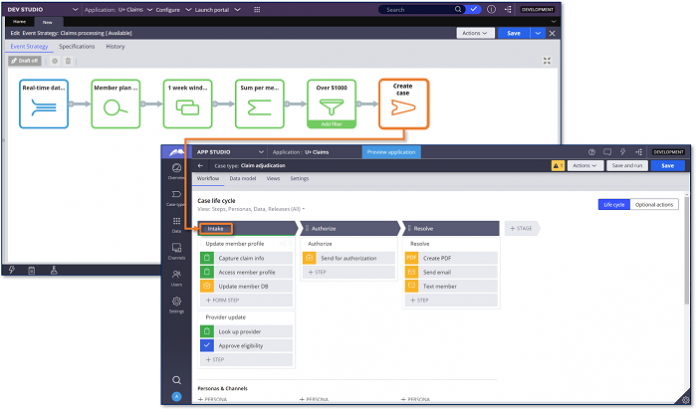A new set of Pega Platform capabilities that help organizations optimize their business and customer operations in real-time. By infusing self-optimizing AI and decision management into its low-code process automation software, Pega offers the only solution that can intelligently triage millions of incoming customer requests, transactions, and other events at an enterprise scale. This enables fast and effective event resolutions while helping to lower operating costs and simplify employee and customer experiences.
As digital expectations continue to skyrocket, organizations are turning to process automation to more efficiently assist their employees and customers. But most automation solutions are too slow and rigid to meet the dynamic needs of the enterprise and even lack basic business rules capabilities. While some automation offerings have been enhanced with AI, they still can’t scale enough to analyze the massive streams of data signals being emitted from customers that can help organizations make smarter decisions.
Process AI turbocharges the value of process automation by applying powerful and proven real-time AI, event stream processing, machine learning, decisioning, and natural language processing (NLP) to any business process. These capabilities analyze millions of streaming events and immediately make intelligent decisions so each case gets quickly resolved. Using hundreds of self-learning models, Process AI also streamlines inefficient processes on the fly to better optimize business outcomes. This enables enterprises to more effectively and efficiently resolve events – and even anticipate issues before they arise – so they deliver the best possible customer and employee experiences.
For example, an insurance company can use Process AI to triage a surge of incoming claim requests after a major storm by automatically approving claims or routing more complex incidents to the best available agent; a financial services company can scan fraud alerts in real-time and automatically open a case for a relevant security expert to investigate; or a manufacturer can analyze IOT-connected device signals and, if it predicts trouble on the horizon, proactively open a service ticket and notify a dealer and end customer to the potential issue.
With Process AI, organizations can optimize and simplify their back-end processes to realize the following benefits:
Deliver more effective service at scale – Process AI analyzes thousands of events per second with advanced event processing and real-time decisions to determine which requests can be automatically processed and which need human assistance to resolve. If it identifies a particularly complex issue, the software will open a case, populate it with the available information, and intelligently route it to the most relevant expert to resolve it. This helps organizations quickly and accurately make the right servicing decisions that result in optimal customer outcomes – even during high-volume service times for the largest and most complex companies.
Increase process efficiency on the fly – As the system processes more events, it uses predictive analytics and machine learning to monitor case outcomes and uncover new ways to improve the process. Those learnings are applied on the fly so the process works more efficiently the next time a similar case arises, saving the organization valuable time and resources. Over time, the system continues to dynamically fine-tune its processes as conditions change, resulting in even more efficiencies while adapting to new variables.
Make it easy to create and modify process AI models – Process AI provides a low-code machine learning authoring interface that simplifies how to process AI models are developed and managed over their lifecycle. Users can easily update their models as changes are needed over time. Model reports allow users to monitor the model’s health and performance. Optimized for cross-functional fusion teams, the functionality can be customized for different user personas, enabling better collaboration between IT, data scientists, and business users.
As with all AI capabilities, Process AI adheres to the tenets of Responsible AI. This helps ensure algorithms result in fair and balanced outcomes that avoid unintended bias. Pega gives users more control over their AI by providing transparency settings to help companies mitigate potential risks and maintain regulatory compliance. In addition, it provides robust self-learning capabilities that can handle outlier events when exposed to real-world circumstances.
Process AI is part of Pega Platform, a unified and open platform providing a seamless Center-out method for connecting operational processes with customer experiences. Using case management as the foundation, organizations are able to create applications fast with Pega’s low-code approach, empowering developers regardless of their skill level. With Pega Platform, users can achieve end-to-end automation with an enterprise-grade, low-code business automation platform that gets work done makes better decisions, and ultimately reduces cost, complexity, and uncertainty.








